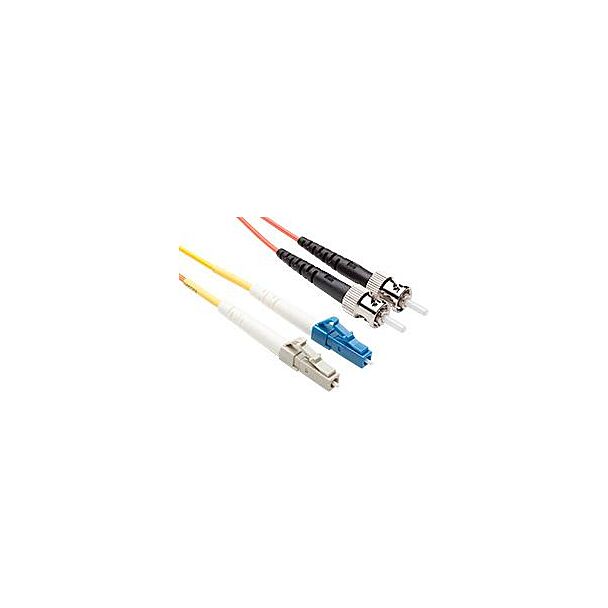Comsol FLCEST-MCP-03-OM1 3mtr Mode Conditioning Patch Cable LC Equipment (Single-Mode) to ST Cable Plant (Multi-Mode) LSZH 62.5/125 OM1
| Location | Availability |
|---|---|
Online (Delivery) | End of Life |
Notting Hill (Pickup) | End of Life |
Preston (Pickup) | End of Life |
West Melbourne (Pickup) | End of Life |
Mode conditioning patch cables (MCP) are used in applications where Gigabit Ethernet 1000BASE-LX/LH routers, switches or transceivers are deployed into existing multi-mode system backbones. Mode conditioning patch cables are used in the 1300nm or 1310nm optical wavelength window and should never be used for 1000BASE-SX links in the 850nm short wavelength window.
Although it is possible to connect 1000BASE-LX/LH equipment using existing multi-mode fibre cabling over short distances without the use of mode conditioning patch cables, this will result in high bit error rates and continued use can eventually lead to damage to the device.
All our mode conditioning patch cables feature a flame retardant LSZH (Low Smoke, Zero Halogen) cable jacket to ensure minimal toxic and corrosive gas emissions in the event of a fire, making them compatible with most data centre requirements and critical area applications.
Mode conditioning patch cables must be used in pairs, meaning that you will need a mode conditioning patch cable at each end to connect the equipment to the cable plant.
On your Gigabit Ethernet LX/LH equipment, please be sure to connect the yellow cable segment (single-mode) of the cable to the transmit side and the orange cable segment (multi-mode) to the receive side. It is imperative that this configuration is maintained on both ends. The swap of transmit and receive can only be done at the cable plant (patch panel) side.
Features
• Equipment Side: LC male duplex connector (single mode is yellow)
• Cable Plant (Patch Panel) Side: ST male duplex connector
• Orange 62.5/125 OM1 fibre cable with LSZH jacket
• Compliant with IEEE-802.3z Gigabit Ethernet
• Bandwidth: 500 MHz-km @ 1300 nm
• 100% optically tested and supplied with individual insertion loss test report
• Typical insertion loss <0.5dB
• Typical return loss>50dB
• Lifetime warranty

